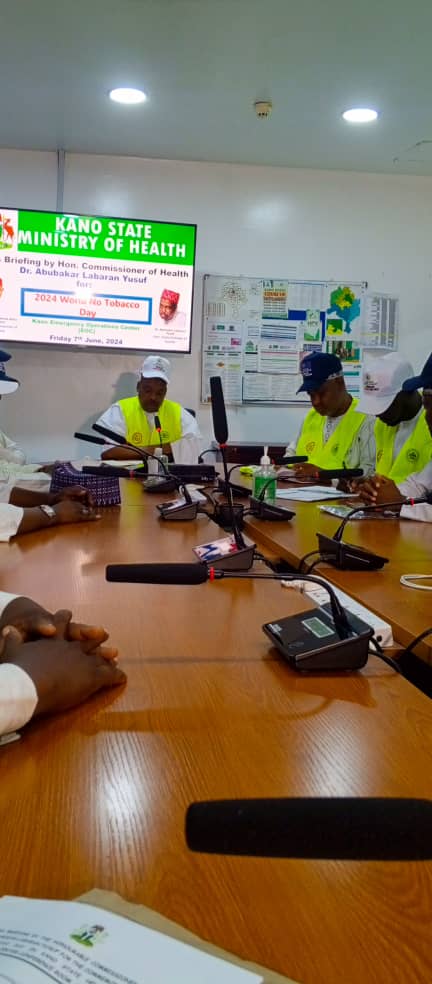By Usman Usman Garba
Kano State Ministry of Health in collaboration with the Ministry of Education has planning to establish Tobacco-Free Clubs in some selected secondary schools due to the its danger among the public and health system.
This was revealed by the Honourable Commissioner of Health, Dr. Abubakar Labaran Yusuf during a press briefing for 2024 World No Tobacco Day, Themed “Protecting children from tobacco industry interference,” held at Kano Emergency Operations Center (EOC), Muhammad Wase Teaching Hospital, Friday.
He said, “I am pleased to address you this morning for the commemoration of 2024 World No Tobacco Day (WNTD) in Kano State.
“This occasion is particularly important as it is set out to inform the public on the dangers of using tobacco, the business practices of tobacco companies, what government and partners are doing to fight the tobacco epidemic, and what people around the world can do to claim their right to health and healthy living and to protect future generations.
“The Ministry in collaboration with state Ministry of Education is planning to commence the establishment Tobacco-Free Clubs in some selected secondary schools and also planning to sensitize owners and managers of public places (both indoors and outdoors) e.g. Hotels, Motor parks, markets etc. on the enforcement of the smokefree provision of the NTC Act and Regulations.
“It also engages in training of law enforcement officers from several law enforcement agencies on enforcing the National Tobacco Control (NTC) Act 2015 in which the Act contains several provisions that provides for the protection of children, such as the ban on sale and purchase of tobacco and tobacco products by minors.”
Similarly, the commissioner informed that harms from tobacco begin before birth, as pregnant women who smoke (or as second-hand smoke) gave birth to infants at higher risk of congenital disorders, cancer, lung diseases, and sudden death.
Adding that, According to World Health Organization, globally, tobacco accounts for more than 8 million deaths annually, with more than 7 million of those deaths coming from direct tobacco use while about 1.2 million as a result of non-smokers who are exposed to second-hand smoke.
He has, however, emphasized that, globally, 942 million men and 175 million women ages 15 or older are current smokers.
“It has been noted recently prevalence of tobacco smoking is increasing in sub-Saharan Africa including Nigeria (Tobacco Atlas, 2018).
“In Nigeria, the 2012 Global Adult Tobacco Survey (GATS), showed that 5.6% (4.5 million) Nigerians 15 years and older were currently using tobacco products of which 3.9% (3.1 million) were current smokers.
“A study has shown that youths smoking cigarettes in Kano are 6.2% (Boys 11.4%, Girls 1.8%), the commissioner suggested.
He suggested that governments should implement stronger tobacco control policies which include creating more awareness on danger of tobacco smoking, raising taxes to increase prices of tobacco products among other measures.
Dr. Yusuf also thanked His Excellency the Executive Governor of Kano State Alhaji Abba Kabir Yusuf for his immense support to the health sector and His Royal Highness, the Emir of Kano Malam Muhammadu Sanusi II for his immense support to healthcare delivery in the State.
He lastly appreciated the immense contributions of the Federal Ministry of Health, NPHCDA and some development partners such as the WHO, UNICEF, Management Sciences for Health (MSH), Health Strategy and Delivery Foundation (HSDF), Project HOPE, Lafiya, Bill & Melinda Gates Foundation, Aliko Dangote Foundation, Rotary, CHAI, Malaria Consortium, Solina, KECCOH among others for their support in improving the lives of the people of Kano.
Know that Tobacco is the major risk factor for Non-Communicable Diseases (NCDs) and is associated with higher risk of developing severe outcomes from these diseases and eventually death.
Some of the identifiable risks from smoking include chronic obstructive pulmonary diseases, coronary heart disease, hypertensive heart disease, chronic obstructive pulmonary diseases, renal failure, cancers, intestinal ischemia among others.


